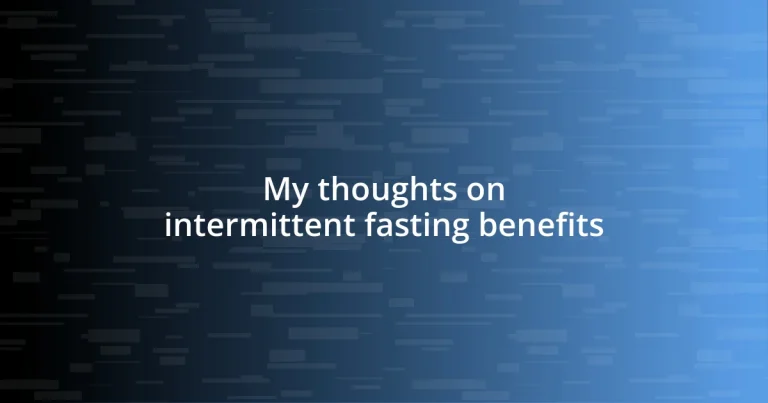Key takeaways:
- Intermittent fasting promotes a healthier relationship with food, aids in weight management, and enhances mental clarity.
- Key principles include flexibility in fasting schedules, focusing on quality nutrition, and various fasting methods such as 16:8 and 5:2.
- Health benefits encompass weight loss, improved metabolic health, reduced inflammation, and better psychological resilience.
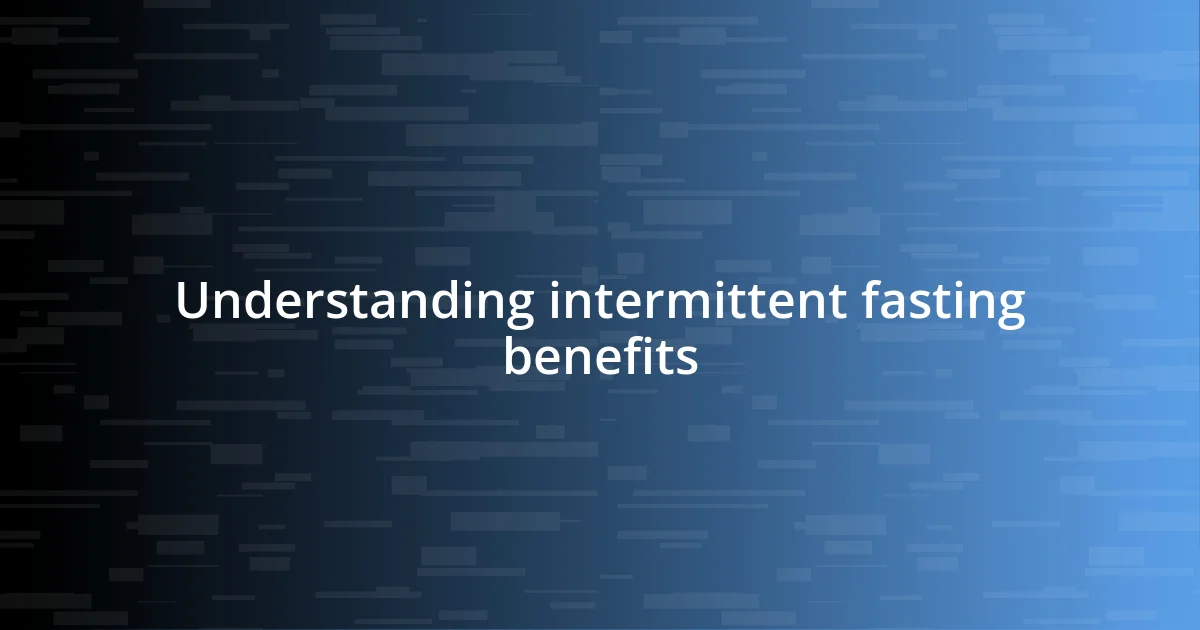
Understanding intermittent fasting benefits
When I first encountered intermittent fasting, I was intrigued by its potential benefits, especially for weight management and improved energy levels. Imagine having the freedom to enjoy meals without feeling guilty about the number of times you eat throughout the day. This eating pattern not only simplifies meal planning but also encourages a healthier relationship with food.
One fascinating aspect of intermittent fasting that I’ve personally experienced is the mental clarity it can bring. There were days when I noticed a significant boost in focus during my fasting hours, almost as if my brain was operating at a higher level. Have you ever felt that euphoric lightness after skipping a meal? It’s surprising how our bodies can adapt and thrive during fasting periods, prompting us to reflect on our usual eating habits.
Additionally, I’ve read how intermittent fasting can positively affect metabolic health, which resonates deeply with many of us striving for longevity. The thought of my body efficiently burning fat during the fasting stages really inspires me. Could this be a game-changer for long-term health? After all, our choices today can set the tone for our well-being tomorrow.
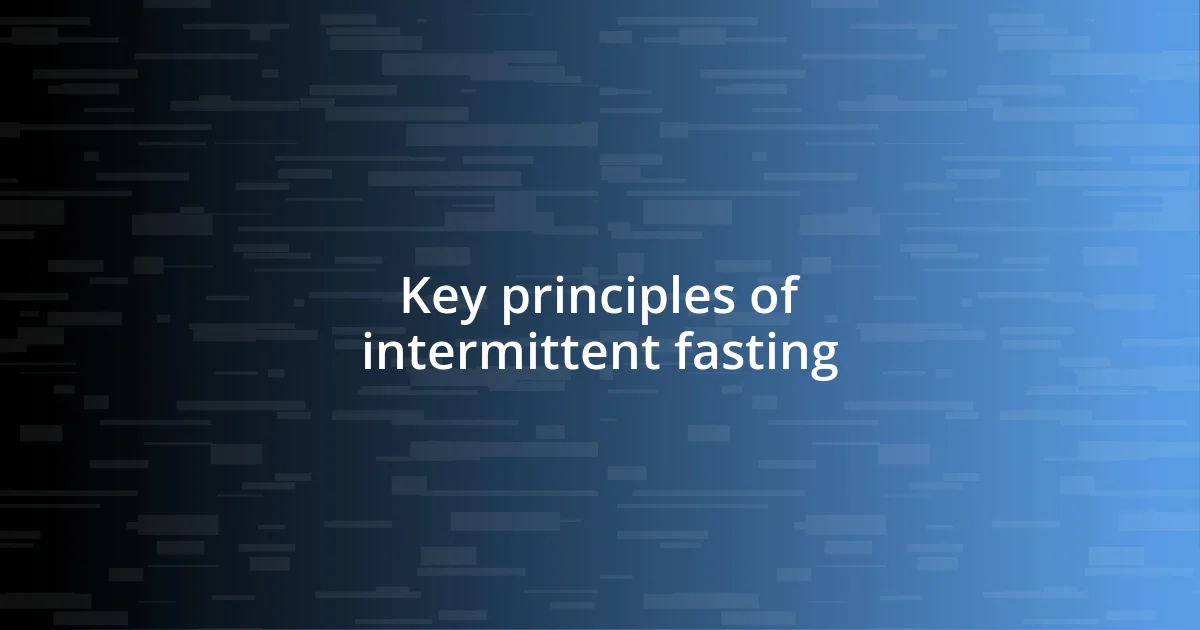
Key principles of intermittent fasting
Intermittent fasting revolves around the core principle of cycling between periods of eating and fasting. This pattern helps the body shift from using glucose for energy to tapping into fat reserves, which can lead to weight loss. I remember when I first tried this approach; it was both challenging and liberating. Initially, the hunger pangs were a hurdle, but as my body adjusted, I felt a newfound sense of control over my cravings.
At the heart of intermittent fasting lies flexibility. There are various methods, each catering to different lifestyles. For instance, the 16:8 method allowed me to enjoy a satisfying breakfast while keeping my fasting window manageable. Some days, I’d even dabble in the 24-hour fast, and surprisingly, I found that it really wasn’t as daunting as I had imagined.
Another essential principle is the focus on quality nutrition during eating periods. It’s not just about when you eat, but also what you eat. I’ve learned that dining on whole, nutrient-dense foods during my eating windows amplifies the benefits of fasting. Does that mean I give up my favorite treats? Not at all! It’s about balance and making mindful choices that nourish my body and spirit.
| Fasting Type | Description |
|---|---|
| 16:8 | Fast for 16 hours, eat during an 8-hour window. |
| 5:2 | Eat normally for 5 days, limit calories to 500-600 for 2 days. |
| 24-hour fast | Once or twice a week, refrain from eating for 24 hours. |
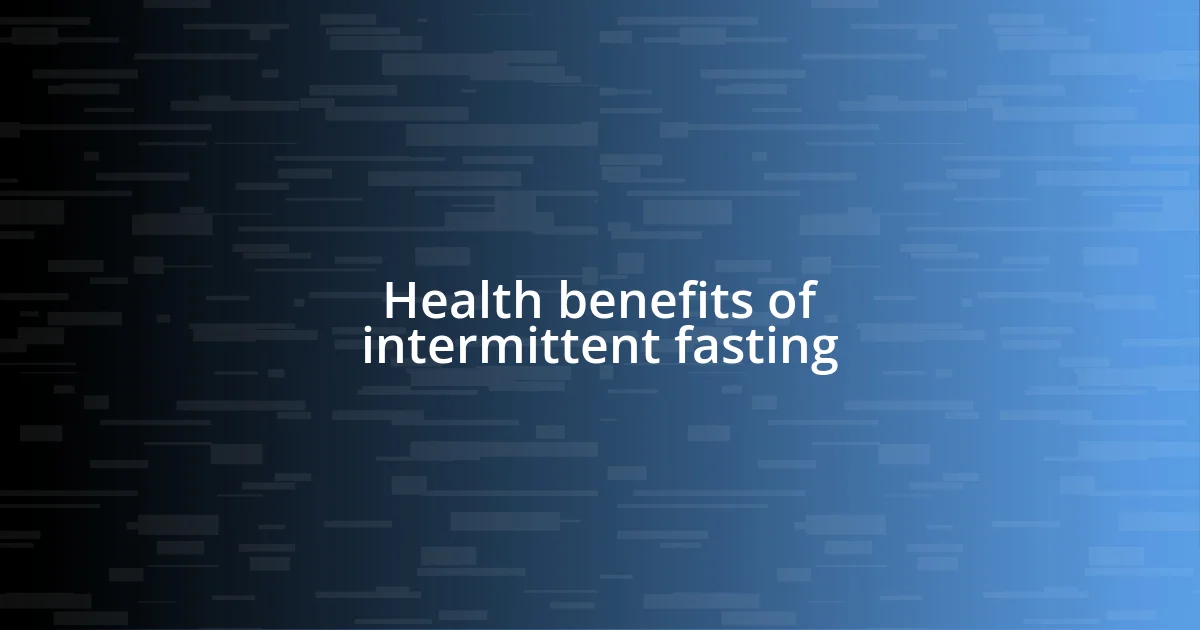
Health benefits of intermittent fasting
Intermittent fasting has profoundly impacted my health, particularly in managing my blood sugar levels. I’ve noticed that on days I skip breakfast, my energy remains steady without those frustrating spikes and crashes. It’s almost liberating to experience such consistent energy. I’ve come to appreciate how fasting may enhance insulin sensitivity, lowering my risk of developing type 2 diabetes.
Here are some noteworthy health benefits I’ve encountered with intermittent fasting:
- Weight Loss: Fasting encourages the body to burn fat for energy, which can lead to effective weight management.
- Improved Heart Health: It can lower cholesterol and blood pressure, contributing to overall cardiovascular well-being.
- Reduced Inflammation: Fasting has been shown to decrease markers of inflammation, which is a precursor to many chronic diseases.
- Mental Sharpness: The clarity I’ve felt during fasting hours makes me believe that it might support brain health and enhance cognitive function.
- Longer Lifespan: There’s intriguing research suggesting that intermittent fasting can promote longevity by reducing the risk of age-related diseases.
Experiencing these positive changes firsthand reassures me that I’m on the right path with intermittent fasting. During my fasting periods, I often find myself more in tune with my body’s needs, which is a wonderful feeling. It’s like having a reset button for my health, one that I truly value.
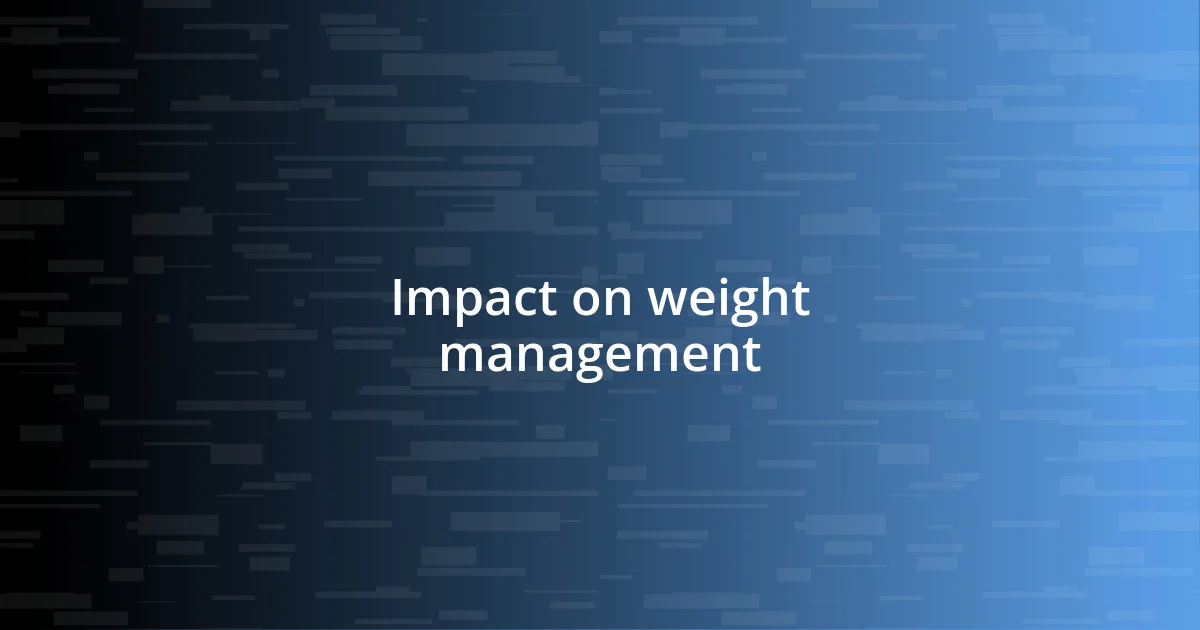
Impact on weight management
The impact of intermittent fasting on weight management can be quite profound. When I first started fasting, I was amazed at how quickly I began to shed those stubborn pounds. It wasn’t just about cutting calories; it felt like I was finally giving my body the chance to access stored fat for energy. Have you ever struggled with weight loss? I know I did, and this approach provided me with a newfound sense of freedom.
What truly surprised me was how my relationship with food transformed. There were days when I wouldn’t realize just how little I was eating until I glanced at the clock and realized my eating window had closed. I also noticed that my cravings shifted towards healthier options. Fasting helped me to pay attention to what I was consuming, leading to better food choices. Isn’t it interesting how a simple change in when you eat can influence what you eat?
I also found community support invaluable on this journey. Sharing experiences and tips with others who are also practicing intermittent fasting made my weight management efforts feel less isolated. I remember a long conversation with a friend who similarly struggled with weight; together, we celebrated small victories and leaned on each other during challenging days. This sense of camaraderie underscored the idea that while fasting is a personal journey, having a support system can amplify its success in managing weight.

Effects on metabolic health
Intermittent fasting has had a significant effect on my metabolic health that I didn’t see coming. I vividly remember the moment I checked my glucose levels after several weeks of fasting; the numbers were impressively stable. It’s intriguing to think about how such a simple adjustment to my eating schedule could lead to enhanced insulin sensitivity—a vital factor for preventing potential metabolic disorders. Have you ever felt that surge of hope from seeing positive changes in your health metrics? I certainly did.
As I continued my fasting journey, I discovered the profound impact on my metabolism. There were days when I was pleasantly surprised at how my body seemed to adapt, efficiently utilizing energy without the constant need for food. It’s almost like my body had been waiting for that nudge to switch gears. This adaptability has not only improved my metabolic rate but has also opened my eyes to the wonders of metabolic flexibility. Knowing that my body can efficiently switch between burning fat and glucose feels empowering; it’s something I hadn’t fully appreciated before.
Reflecting on my experiences, I can’t help but share how much my perspective on hunger has shifted. Each fasting period has been a reminder that hunger is not always a sign of weakness; rather, it can be a powerful tool for metabolic health. When my stomach growls, I’ve learned to listen, but I’ve also realized that fasting helps me tune into my body’s actual needs. This deeper understanding of how my metabolism operates has enriched my relationship with food and, ultimately, with my health. Have you ever thought of hunger as an opportunity for better health? It’s quite a transformative realization!
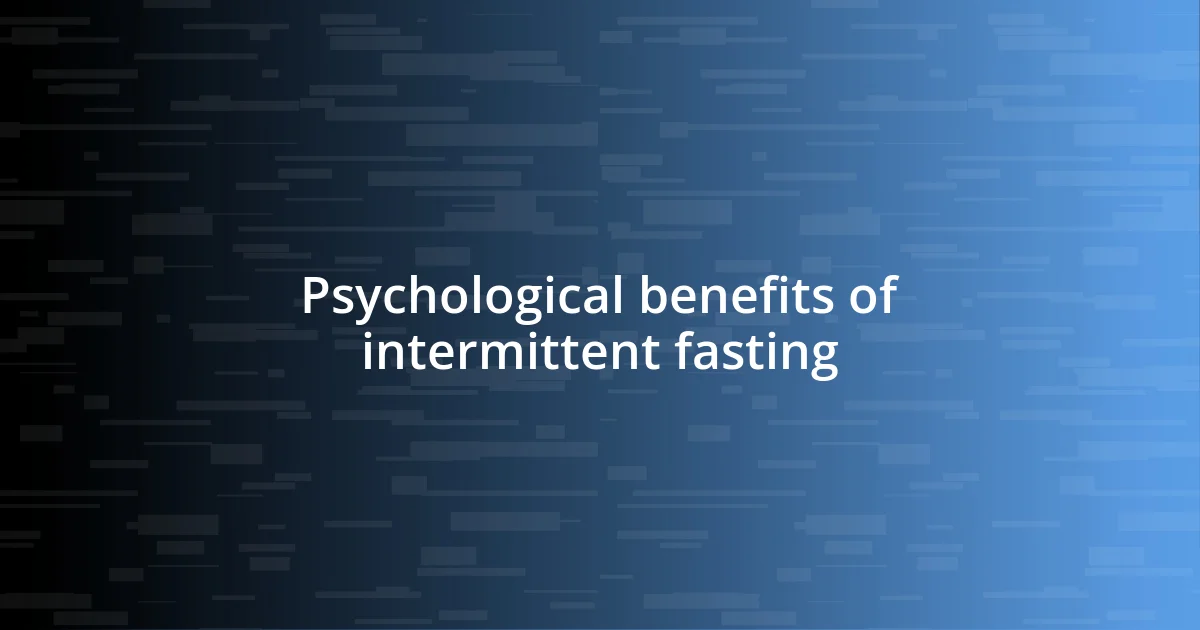
Psychological benefits of intermittent fasting
The psychological benefits of intermittent fasting have become more apparent to me over time. Initially, I thought it would just be about food and weight loss, but I soon realized it impacted my mindset significantly. I remember one afternoon feeling a rush of clarity while fasting; it was as if my brain was suddenly unplugged from the fog that often comes with post-meal drowsiness. Have you ever felt that mental clarity when your mind is freed from the cycle of constant snacking? It’s a refreshing change.
Another fascinating aspect has been my relationship with self-discipline. Intermittent fasting has challenged me to become more mindful of my choices. I can’t tell you how empowering it felt the first time I resisted the urge to snack while binge-watching my favorite show. I realized then that I had the strength to say no not only to food but to the impulses that typically ran my life. Isn’t it interesting how setting boundaries in one area can ripple through others?
Perhaps the most profound shift has been in how I approach stress. In the past, I often turned to food for comfort during tough times. Through fasting, I’ve developed healthier coping mechanisms, like journaling or a brisk walk instead of reaching for snacks. This newfound control over my impulses has significantly lowered my stress levels. I often ask myself, “What would I choose to relieve stress in this moment?” The answers have led to healthier habits and a stronger sense of emotional resilience. How has your relationship with stress influenced your eating habits?
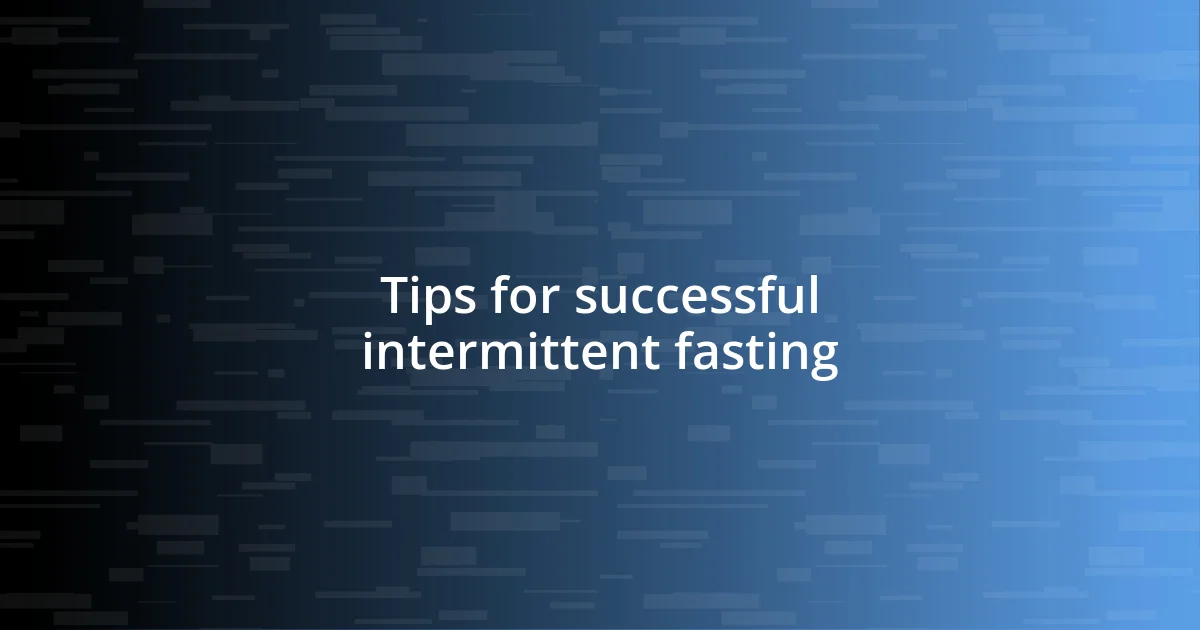
Tips for successful intermittent fasting
One of the best tips for successful intermittent fasting is to find an eating window that suits your lifestyle. I remember when I first started, I experimented with different time frames—some days I felt energized breaking my fast around noon, while other days an earlier start worked better for me. Have you ever tried adjusting your schedule to find that sweet spot? It can make a world of difference in sticking to the plan.
Staying hydrated during fasting periods is crucial. I often find myself reaching for water, herbal teas, or black coffee to keep those hunger pangs at bay, and it’s surprising how well it works. There have been moments when I thought I was truly hungry, only to realize that a glass of water could satisfy that feeling. It’s amazing how simple hydration can curb cravings and keep you feeling energized! Have you discovered your favorite beverages that help you stay on track?
Another practical tip is to ease into it gradually if you’re new to intermittent fasting. I recall my first week; I thought I had to dive straight into a 16-hour fast. Instead, I started with 12 hours and increased the duration as I became more comfortable. Listening to your body is key—what does it tell you about hunger and fullness? Taking it slow can help build a sustainable routine without feeling overwhelmed.












